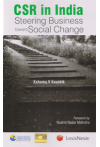- Author(s): Kshama V Kaushik
- Publisher: LexisNexis
- Edition: 1 Ed 2017
- ISBN 13 9788131250945
- Approx. Pages 249 + Contents
- Delivery Time 3-5 working days (within Kerala & South India) (Others 7-9 days)
............................................................................................................................
Description
The concept of businesses giving back to society is as old as commerce, variously known as charity, philanthropy, social work, etc. With the advent of modern businesses, this giving back is more systematised and is variously known as CSR, sustainability, corporate citizenship or shared value.
Still, CSR is often unstructured, ambiguous and nebulous, in part because it deals with subjects that often defy precision and standardisation. Being an evolving discipline, CSR lacks a universally agreed theory to address issues of organisation, structure, strategy, culture, frameworks, etc. that are standard for other corporate disciplines.The Companies Act, 2013 has added to the complexity by 'mandating' corporate spends on CSR, directing where such money is to be spent and requiring Board and senior management attention. For too long CSR in India had been left to non-directional, haphazard do-gooding; 'Governance' — the process through which decisions are taken — of CSR through the law is expected to inject greater professionalism in the full range of CSR operations.
............................................................................................................................
Contents
1. The Idea of CSR
2. CSR and Stakeholders
3. CSR and Law — Translation of Ideals to Mandates
4. Role of the Board of Directors in CSR
5. Developing a Strategic Approach to CSR Program
6. Reporting Frameworks
7. CSR a Tool for Sustainable and Inclusive Development
8. Roadmap for Social Change
Annexures
Annexure-I: Lists of Performance Indicators ofGRI, ISO 26000
and BRR (Variously Described as Aspects in GRI,
Issues in ISO 260000 and Performance Indicators in BRR)
Annexure-II: Core Elements of BRR's 9 Principles
Annexure-III:CSR Format as per Companies (CSR Policy) Rules,
2014, Regarding Activities and
Money Spent
Annexure-IV: Linkage Table between BRR (NVG) and ISO 26000
Annexure-V: Sustainable Development Goals Adopted by UN in
September 2015
Annexure-VI: CSR Spending by Top 100 BSE-Listed Companies in
FY 2014-15
Annexure-VII: Section 135 of the Companies Act 2013
Annexure-VIII: Schedule VII
Annexure-IX: Companies (Corporate Social Responsibility Policy)
Rules, 2014
Subject Index
............................................................................................................................
Author Details
Kshama V Kaushik is the founder director of Thought Arbitrage Research Institute (TARI) where she conceptualises and leads research
studies and collaborations with a range of partners including government agencies, regulators, public and private sector Indian companies, industry associations and multi-lateral agencies. Her abiding interests include governance, transparency, anti-corruption and sustainability practices, where she has worked with some of the leading institutions like Indian Institute Management, Indian Institute of Corporate Affairs, various Ministries of Government of India, The Energy Research Institute (TERI), Assocham, Asian Development Bank, DFID, FICCI.GIZetc.
............................................................................................................................

